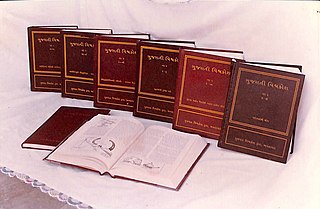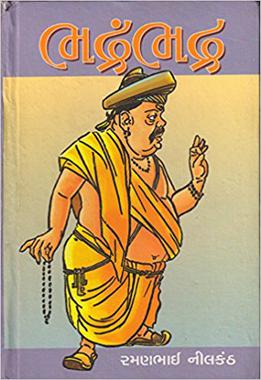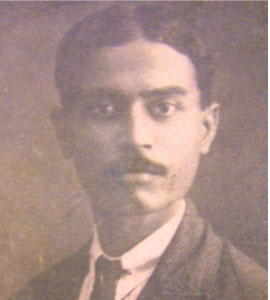The history of Gujarati literature may be traced to 1000 AD, and this literature has flourished since then to the present. It is unique in having almost no patronage from a ruling dynasty, other than its composers.

Nanalal Dalpatram Kavi was an Indian writer and poet in Gujarati language of Gujarati literature. His name is sometimes spelled as Nhanalal.

Kumarpal Balabhai Desai is an author, critic, editor, journalist, columnist and translator from Gujarat, India. He studied and later taught at the Gujarat University. He is associated with several social and Gujarati literary organisations such as Gujarati Sahitya Parishad. He has written and edited more than hundred books including biographies and several works on Jainism. He was awarded the Padma Shri in 2004.

Gujarati Vishwakosh is an encyclopedia in Gujarati, one of the official languages of India, published by Gujarat Vishwakosh Trust, Ahmedabad, Gujarat, India. It can be considered the first full encyclopedia in the Gujarati language. Under the guidance of Dhirubhai Thaker, the work started in 1985 and ended in 2009 consisting of 25 volumes with 23,090 articles.
Manilal Bhagwanji Desai was a Gujarati poet from India.

Chandrakant Sheth is a Gujarati poet, essayist, critic, translator and compiler from Gujarat, India. His pen names include Aryaputra, Nand Samavedi, Balchadra and Daksh Prajapati. He won the Sahitya Akademi Award for Gujarati in 1986 for his book Dhoolmani Paglio.

Radheshyam Sharma was a Gujarati language poet, novelist, short story writer, critic and compiler from the state of Gujarat, India. He is known in Gujarati literature for his experimental novels Fero (1968) and Swapnatirtha (1979). His other significant works include Aansu Ane Chandaranu (1963), and Gujarati Navalkatha, a work of literary criticism on Gujarati novels. Sharma was awarded the Gujarati literary honours Ranjitram Suvarna Chandrak, in 2004, and Dhanji Kanji Gandhi Suvarna Chandrak, in 1995.

Chimanlal Shivshankar Trivedi was a Gujarati critic and editor from Gujarat, India.

Bhadrambhadra is a 1900 Gujarati satirical novel by Ramanbhai Neelkanth. It is regarded as the first humorous novel in Gujarati literature and as the first Gujarati novel written in the first person narrative. Ramanbhai used the novel to illustrate the ridiculousness of a highly orthodox view of Gujarati society and as a vehicle for social reform.
Navalram Jagnnath Trivedi (1895–1944) was a Gujarati writer, critic and editor. He served as a secretary of Gujarat Sahitya Sabha for twenty years.
Gujarati was a Gujarati language weekly published from 1880 to 1929 by Ichcharam Desai and his sons.

Nrusinhavatar is one of the two Gujarati plays written by Manilal Nabhubhai Dwivedi, the other is Kanta. Written probably in 1896, it recounts the puranic mythological tale of Nrusinhavatar. It was first staged by the Mumbai Gujarati Natak Company in 1899 but was unsuccessful. It was staged again in 1906-07 and became successful. It was edited and published as the book by Dhirubhai Thaker in 1955.
Rambha Manmohan Gandhi was an Indian Gujarati language writer who wrote plays, short stories, songs, and essays, publishing 44 books in her career.

Sudarshan Gadyawali is a 1909 collection of prose writings by Gujarati writer Manilal Dwivedi (1858–1898), which appeared in his journals Priyamvada and Sudarshan from 1885 to 1898. It contains essays on a broad range of subjects, including religion, ethics, social reform, education, politics, nationalism, theosophy, women's welfare, Eastern and Western philosophy, music, and literature, in addition to a number of book reviews.

Kanchanlal Vasudev Mehta, better known by his pen name Malayanil, was a Gujarati short story writer from British India known for his humorous pieces. He was a pioneer of modern short story writing in Gujarati.
Uttamlal Keshavlal Trivedi was a Gujarati writer and translator from India.
Chimanlal Narandas Patel was an Indian writer, literary critic and translator from Gujarat, India. He received the Ranjitram Suvarna Chandrak in 2000 for his contribution to Gujarati literature.
Jnanasudha was a Gujarati magazine that ran from 1892 to 1919, in which Ramanbhai Neelkanth edited.
Jashwant Thaker was an Indian actor, playwright and director of Gujarati theatre. He directed and acted in several successful plays. He was awarded the Sangeet Natak Akademi Award in 1968, the Ranjitram Suvarna Chandrak in 1977 and the Soviet Land Award in 1986.

Swami Sachchidanand, born as Nanalal Motilal Trivedi, is an Indian social reformer, philosopher, welfare activist, humanitarian, religious ascetic and writer from Gujarat, India. He was awarded the Narmad Suvarna Chandrak in 1984 and the Padma Bhushan, India's third highest civilian award, in 2022 by the Indian Government in the field of Literature and Education.














